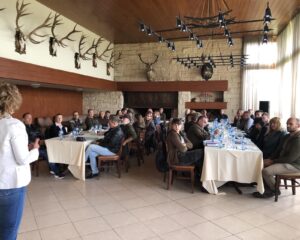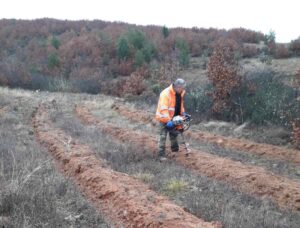The activities of experimental afforestation with drought-resistant tree species are implemented under the Project ” Climate-Smart Forest Management for Central and Eastern Europe” CLIMAFORCEELIFE (LIFE19CCA/SK/001276). It is expected that 10 hectares of forest crops will be created with the participation of drought-resistant oak species – Quercus ilex , Quercus suber, Quercus pubеscens, Quercus coccifera, Quercus ithaburensis, as well as Cedrus atlantica, Cupressus sempervirens, Pinus nigra and Pinus brutia . A reforestation scheme is planned for part of the area, in which seed production gardens will be created of tree species that are increasingly rare on the territory of our country. Areas have been determined in the southernmost part of the Enterprise on the territory of Gotse Delchev Foresty, Petrich Forestry and Sandanski Forestry, in order to carry out observations on the possibility of using the selected drought-resistant species for larger-scale afforestation. The general principle and considerations underlying the selection of species for afforestation are based on their biological characteristics and ecological requirements. Most of these are species that are at least partially distributed in subtropical areas and have a certain capacity to adapt to the drying climate trend observed in recent decades. Local tree species (indigenous species from the dendroflora of Bulgaria) and foreign species are included.
Within the framework of the activities of the Project, on 29.09.2022, in the State Hunting Vitoshko Studena”, a training on the topic “The influence of climate changes on forest territories” was held. Representatives of all the Territorial Divisions of the SWSFE participated, who were familiar with the concept of climate change and its impact on biodiversity in forest territories – drought, torrential rains, extreme temperatures and increased risk of fires. Special attention was paid to the ongoing project ” Climate-Smart Forest Management for Central and Eastern Europe”, with the acronym CLIMAFORCEELIFE (LIFE19CCA/SK/001276), the activities of which are closely related to the topic of the training and aroused special interest from the attendees. The selected tree species for the experimental afforestation under the Project were discussed, the practices and observations of the foresters, who were present on this meeting from the Forestries and the Forestry University, were shared.
At the beginning of January, a national conference on the problems of climate change will be held, during which the leading speakers will be representatives of WWF Bulgaria, professors from the Forestry University, as well as representatives of the Project partners.
Forests in the region of Central and Eastern Europe represent an important natural resource. Their importance is likely to increase in the near future. This is due not only to the growing demand for wood, but also to the growing public awareness of the ecosystem services provided by forests. Although economic and social demands are sometimes in conflict, the provision of both services by forests today is threatened by climate change. Current forest management will have to adapt to climate change, not to reduce its negative effects (such as drought, increased water runoff, soil erosion…) but instead to increase the resilience of forests to climate change.
The overall goal of the Project, in which the SWSFE implements and is a partner, is to improve the management of forests in Central and Eastern Europe by promoting the transition to climate-smart forestry for the benefit of people and nature.









